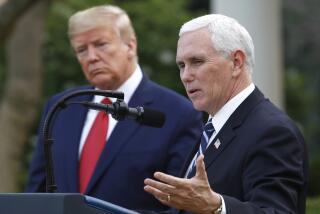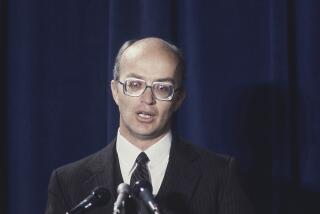Perot’s Top Economic Adviser Switches to Clinton Campaign : Politics: White joins Democratic camp after telling the Texas billionaire not to run for President. He was a major influence on Perot’s deficit plan.
- Share via
WASHINGTON — Ross Perot’s chief economic adviser, business executive John P. White, has defected to Arkansas Gov. Bill Clinton’s campaign after telling Perot he would be making a mistake and hurting his own credibility if he entered the presidential race.
White, 54, who served as assistant secretary of defense and as deputy director of the Office of Management and Budget in the Jimmy Carter Administration, returned to his job at the Eastman Kodak Co. in Syracuse, N.Y., on Thursday, shortly before Perot announced his candidacy.
In an interview with The Times, White said he told Perot he should not run, that he had no chance of winning and would be a potential spoiler. Also, White said, he told Perot he would be “hurting his own credibility and his message” that the nation desperately needs to address the problem of runaway budget deficits.
White said Perot has no interest in being President, that his real goal is to publicize his plan to address the deficit, which is spelled out in his paperback bestseller, “United We Stand: How We Can Take Back Our Country.”
White said that when he asked Perot whether he wanted to be President, Perot replied: “Of course not.”
Perot could not be reached for comment Friday.
When White, the major contributor to Perot’s book, told Perot he would not endorse him, Perot told him’Well, we each have to do what we have to do, and you’ve done a super job for me.’
“Perot asked me at that point what I might do and whether I might help Clinton,” said White, “and I said in fact I would, and he said, ‘Well, good, that’s fine.’
“He said, ‘I hope if I have questions, you will help me.’ And I said of course I would. He’s a friend.”
Although White admires Perot, he fears he’s fighting a lonely battle now and will be “debased” by the political process.
With his own departure from the Perot camp, White said: “Perot’s all alone now, operating on automatic pilot.”
Perot jettisoned his professional campaign advisers in July, when he announced he would not be a candidate.
At that time Perot said that he could not win the election and he did not want to be a distraction or perhaps win just enough electoral votes to throw the final decision on the victor into the House of Representatives.
White said that at Perot’s behest he had conferred off and on for several weeks with Mickey Kantor, Clinton’s campaign chairman, and had urged that Clinton adopt some of Perot’s economic recommendations.
Perot had offered to make White available to the campaigns of both Bush and Clinton to discuss the Perot plan to balance the budget. But only the Clinton campaign took him up on the offer.
White said Perot “more than enthusiastically” supported his contacts with the Clinton campaign.
Kantor said White “is terrific, and he’s already been helpful to us.”
White’s exact role in the campaign has not yet been worked out, but Kantor said: “He’ll be consulting on issues and obviously has very special knowledge of budget and economics. He worked very hard on Mr. Perot’s book, and he’s bright and is of tremendous value to us.”
In their discussions, Kantor said, he and White “agreed that one of the main differences” between Clinton’s and Perot’s economic plans was that Perot proposed immediately implementing strong deficit-reduction measures to slow down an already weak economy, while Clinton’s plan calls for “more economic stimulation at the front end and then deficit-reducing measures at the back end.”
“John said our concern about putting the brakes on too fast was legitimate,” said Kantor.
Perot told White and several other associates that he felt he had “trapped” himself into running by promising volunteers that if they secured enough signatures to put his name on the ballots of all 50 states he would announce as a candidate, White said.
In fact, however, evidence has emerged showing that it was only through a multimillion-dollar campaign, financed by Perot himself, that the signatures were collected.
More to Read
Get the L.A. Times Politics newsletter
Deeply reported insights into legislation, politics and policy from Sacramento, Washington and beyond. In your inbox twice per week.
You may occasionally receive promotional content from the Los Angeles Times.










